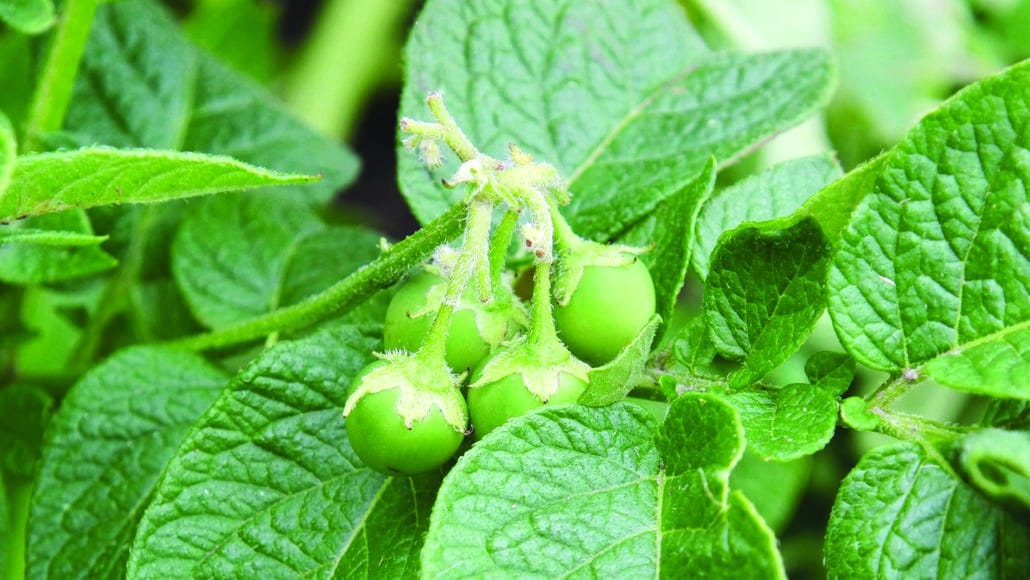[deck]Why Tuberosum Technologies is pursuing what it calls the “Holy Grail” of potato breeding – true potato seed – and what the company hopes to accomplish.[/deck]
For two decades now, Saskatchewan-based Tuberosum Technologies Inc. (TTI) has been striving to make potato production more efficient and sustainable through breeding technologies. To TTI breeders, the answer lies with true potato seed (TPS).
Some potato varieties naturally produce small fruit that contain hundreds of these tiny botanical seeds, which can grow into full tuber producing potato plants. The use of TPS to cultivate potatoes isn’t new, as the practice was born long ago in the Andean highlands where the crop was first domesticated.
In some developing nations, TPS is used as an alternate means to grow potatoes but that’s not really the case in North America, where almost every commercial field is planted with seed tubers.
Joel Vanderschaaf, general manager of the research firm that’s based in Broderick, Sask., says the company’s work led by Khyal Thakur, TTI director of research and development, involves bringing TPS to fruition in a new way.
“We are really working from the Holy Grail of potato breeding – hybrid TPS varieties from the seeds of the potato berry,” he explains. “Small seeds from the potato berry are extracted and can be planted. This allows us to be strategic in the use of the seed from the berries and look for specific attributes.”
Vanderschaaf says utilizing TPS enables rapid multiplication, since one plant can produce roughly 5,000 seeds while clonal propagation of commercial varieties produces only about 10 seed pieces per tuber.
At TTI, TPS varieties are planted in greenhouses and new seedling tubers are replanted the next year. Currently, the company has identified 10 new TPS varieties that are now in bulk preliminary production with promising genetics and are currently in agronomic trials.
“Growing potatoes this way is new and we need to find the best agricultural practices as well as find the most economical way to provide flexibility when growers consider using TPS technology,” explains Vanderschaaf. “We need to understand and know best practices for farmers and that remains our key goal.”
Unlike seed potatoes, TPS is generally free from viruses, easy to transport and can be stored for several years without losing its germination, he says. “The reality is that botanical seed can be stored for years while regular potato pieces will have to be planted much sooner.”
Vanderschaaf notes that TPS offers added flexibility and reduced risk to potato growers if conditions are not favourable to planting. He also describes it a clean seed, “which makes shipping easier in terms of phytosanitary requirements and conditions abroad.”

Consumer Satisfaction Key
TTI works in close collaboration with the Little Potato Company, the successful family firm in Edmonton, Alta. that specializes in the small or creamer style potatoes that have become increasingly popular in recent years.
According to Vanderschaaf, consumer satisfaction remains the ultimate goal for both companies. “We need to remain focused on consumer needs and trends. What really matters is what the consumer wants to purchase,” he says. “Our question, always, at TTI is does it look, cook and taste good?”
Vanderschaaf stresses that the company’s commitment to breed better potatoes is here for the long haul. “We believe that consumers are looking for nutrition and excitement in their daily meals and potatoes can offer this aspect to their diet,” he says, pointing to high antioxidant levels found in the vegetable. “Potatoes can be the superfood of new and healthy choices in the marketplace.”
While there are always ongoing challenges with any business, Vanderschaaf says things in general are going really well at TTI, and that’s the result of having a great team of breeders not only at home but abroad.
“We currently have contracted breeding programs ongoing in Chile, Canada and the Netherlands which are also regions we are looking into abiotic stresses such as salt and drought tolerance in our ever changing climates,” he notes.
These trials are enabling TTI breeders to “see things we haven’t previously – simply by letting the potato take us to where we haven’t been before….It really is a miracle crop,” Vanderschaaf says.
“The world in general will face more challenges in the future in terms of food production and TTI wants to keep food production not only healthy but optimal for everyone around the world.”
Vanderschaaf sees TPS as the next big step to enhance efficiency within the Canadian potato industry. Commercial registrations are needed to enter the regulatory framework within Canada, but TPS technology is well into the regulatory process in both the United States and the Netherlands, he states.
Vanderschaaf hopes that one day soon TPS varieties will be commercially available in Canada, enabling more choices for potato producers. “We hope this momentum will continue as a new crop for Canada,” he says.











